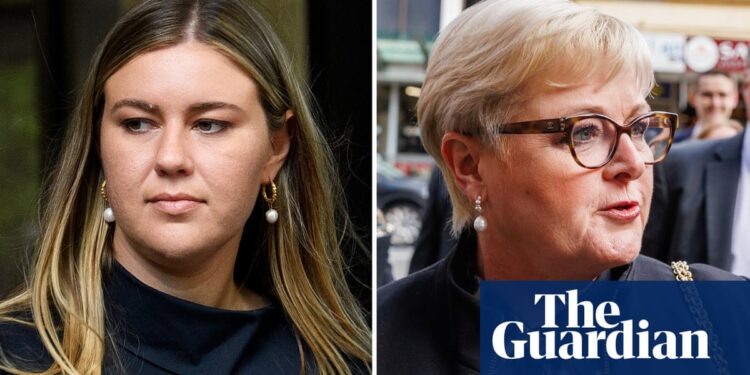Linda Reynolds’ motives in taking her defamation case against Brittany Higgins were “sinister” and focused on the “wrong target”, a court has heard.
Higgins’ lawyer Rachael Young SC began her closing arguments on Monday in the defamation case brought by the Liberal senator Linda Reynolds against her former staffer.
Reynolds sued Higgins over a series of social media posts published in July 2023, which the Liberal senator alleged had damaged her reputation. But Higgins has claimed a defence of truth, saying Reynolds mishandled her rape allegation – which was made public in 2021 – and did not properly support her.
On Monday, Young told the Western Australia supreme court that Reynolds’ “dogged focus” on events in 2021 and 2022 demonstrated her focus was not on the three social media posts in 2023 that she is suing over.
Young described the Liberal senator’s motives as “sinister” and “gratuitous”, and said that while Reynolds had outlined the hurt and distress she experienced by the events in 2021, it was Higgins who held the “heaviest burden”.
Higgins ultimately had an “altruistic purpose” in coming forward about her alleged rape and felt her “continued silence” would make her complicit in Parliament House’s poor workplace behaviour, Young said.
Witness evidence over the weeks has dealt with the alleged harm Reynolds faced by the posts but has also spanned other events across the five-year period after Higgins alleged she had been raped by her colleague Bruce Lehrmann in the then defence minister’s office in Parliament House in 2019.
Lehrmann denies raping Higgins and his criminal trial was derailed by juror misconduct. As part of Lehrmann’s failed defamation trial against Network Ten and Lisa Wilkinson, a federal court in April found that, on the balance of probabilities, he raped Higgins. Lehrmann has appealed against that finding.
On Monday, Young also told the court Reynolds was not a reliable witness. She said Reynolds was “eager to argue her case” rather than answer simple questions. Young characterised some of Reynolds’ responses as “self-serving”, adding she could not answer simple questions without having them repeated numerous times.
Young said, on a number of occasions, Reynolds claimed she couldn’t answer questions without access to contemporaneous notes. Young said this showed the senator’s independent memory of what she knew on 1 April 2019 was unreliable.
Young said that the alleged conspiracy by Higgins and her partner, David Sharaz, to “destroy the senator and bring down the Morrison government” could not be proven.
Young said the evidence instead showed Reynolds harassed Higgins by leaking confidential documents to the Australian newspaper and gave the impression of partisanship during the criminal trial against Lehrmann.
Reynolds also demonstrated she wanted to “shut off” the option for sexual assault complainants to go to the media or parliament, Young said, as outlined in her submission to ACT board of inquiry, helmed by Walter Sofronoff.
Young said this amounted to trying to “silence sexual assault survivors”.
Young also outlined eight pieces of evidence that she said would demonstrate Reynolds knew Higgins had allegedly been raped in her office prior to holding a meeting with her there on 1 April.
The pieces of evidence included that Reynolds gave instructions to her then chief of staff Fiona Brown to refer the case to the Australian Federal Police.
No one “reasonable” involves the federal police unless they suspect a crime has occurred, Young argued.
Young said Reynolds’ claims she did not about Higgins’ alleged rape prior to 1 April 2019 should be rejected.
In the defamation trial, the court has heard from politicians, journalists, staffers and family and friends of Higgins and Reynolds.
Reynolds’ lawyer Martin Bennett opened the trial by saying that “every fairytale needs a villain” and claiming that Higgins and her partner, David Sharaz, had cast the Liberal senator in that role.
Bennett also alleged the two had schemed to ambush the Western Australian senator as part of a sophisticated media plan.
He said Higgins had created a “fictional story of political cover-up”, detailing ill-treatment, ostracisation and bullying by Reynolds, but “none of it was true”.
But Higgins’ lawyer Rachael Young SC responded in opening arguments that the series of events had “never been a fairytale” for her client, and that those comments were “misplaced, harassing and re-traumatising”.
Young told the court the defence case would demonstrate that Reynolds was aware of Higgins’ alleged rape before 1 April 2019 when Higgins and Reynolds held their only meeting on the matter – a claim Reynolds has strongly denied.
The trial before Justice Paul Tottle is expected to conclude by Wednesday.
– with Australian Associated Press







